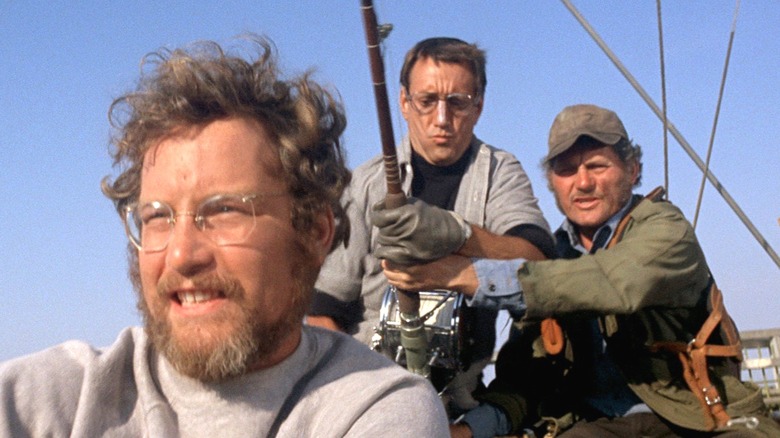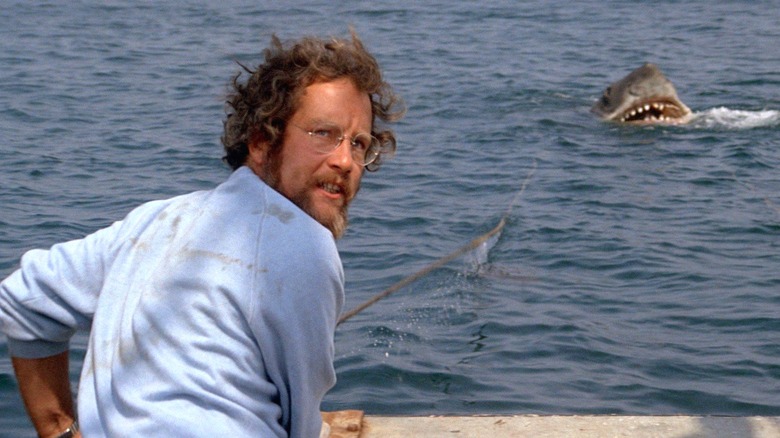Steven Spielberg Thought His 'Career Was Over' Shooting This Classic Movie
Steven Spielberg's "Jaws" has changed the definition of an impeccably crafted summer blockbuster. A cursory glance might paint the film as a standard killer shark flick, but "Jaws" is a scathing critique of systemic human failings that intersect with personal ones. While the aquatic Big Bad is sprung upon us in an unforgettably iconic monster reveal sequence, "Jaws" exposes the learned monstrosities of humans way before the killer shark even shows up onscreen.
Thematic richness aside, the film remains impressive on a technical level, especially if we consider the troubled production that plagued Spielberg since he took over the project. I've said this before, but it is truly a miracle that "Jaws" even got made, as the film had to contend with budgetary issues that inexplicably tripled halfway through the production process.
Money wasn't the only issue plaguing the making of "Jaws," as expensive shoots also meant delayed schedules that somehow got worse due to props malfunctioning due to constant contact with the ocean. Spielberg and co. had underestimated the challenges of filming at sea, especially the sheer unpredictability that came with rapidly changing weather, jeopardizing an already overstuffed production timeline. Thinking back on these multifaceted obstacles, Spielberg told The Hollywood Reporter how he thought his "career was over" as everyone around him warned him that he would never get hired again:
"Everybody was saying to me, 'You are never going to get hired again. This film is way over budget, way over schedule, and you are a real liability as a director. You are not going to get hired again' [...] I really thought that I'd better give this my all because I'm not working in the industry again after they see the movie. Fortunately, fortune smiled on us."
Well, the rest is cinema history. Even so, let us take a closer look at the problems that plagued "Jaws" and how Spielberg pushed through the hellish production to create one of the greatest films ever made.
Spielberg thought the production of Jaws would go swimmingly (it didn't)
The troubled nature of the "Jaws" production debacle has been documented extensively, making it apparent that Spielberg and his crew had no idea about the impact it would have at the time. If anything, Spielberg's concerns about the film being career-ending must've been very real, given that he was a young, up-and-coming director with only three features to his name. In hindsight, even these early entries (including the cult classic, "Duel") exhibited Spielberg's signature brilliance, where he made the most out of the limited tools he had at his disposal. "Jaws" was his first big-budget production, but better resources do not always yield a smoother creative process, which is something Spielberg learned firsthand on set.
Looking back on the experience, Spielberg assumes that his "hubris" led to the thwarted expectations of shooting a big-budget killer shark movie:
"I just really was not ready to endure the amount of obstacles that were thrown in our path. Starting with Mother Nature, my hubris was that I thought we could take a Hollywood crew, go out 12 miles into the Atlantic Ocean, and shoot an entire movie with a mechanical shark. I thought that was going to go swimmingly [...] I was offered, actually, several times a chance to gracefully bow out of the film, not to be replaced by another director, but for the film to be shut down. We shot 158 days, but nobody wanted to quit. Nobody wanted to stop."
While passionate commitment to a creative idea was definitely a factor behind such perseverance, such zeal alone does not feed mouths or put food on the table. Folks in the crew were desperately looking for a reason to justify the grueling experience, as they craved assurance that the film was going to be made (as opposed to being shut down). But nobody, including Spielberg, could guarantee anything, as they had little control over "the shark, the weather, the currents, the regattas," so camaraderie was the only thing that helped them endure such unpredictability. Spielberg's closing sentiments about the crew speak volumes about "Jaws" and the shining legacy it enjoys 50 years since its release:
"...This was the ultimate example that when you work as a team, you can actually get the ball across the finish line. And we did, and I'm very proud of the movie. The film certainly cost me a pound of flesh, but gave me a ton of career. And the success of the movie gave me a chance to make any movie I wanted to make after that."
Well, this is a sign to revisit "Jaws," or even watch it for the first time and soak in all of its sharp-toothed glory. I can guarantee that the experience will not disappoint.

